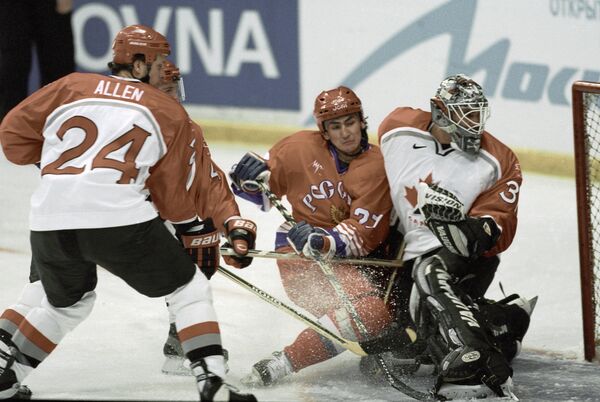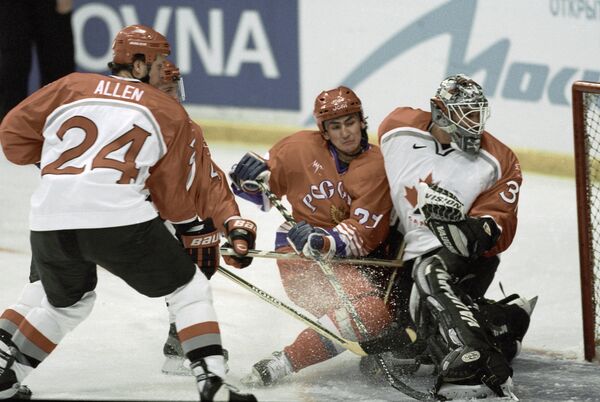The rival of the Russian national team in the quarterfinals in Vancouver will be the Canadian team, as during the 2006 Winter Olympics in Turin. Then the Russian team beat Canadians with a score of 2: 0. According to the head coach of the Canadian team, this time he does not expect any special surprises from Russians and fears only Alexander Ovechkin’s actions.
History of meetings of the national teams of the USSR/Russia and Canada in hockey

The rival of the Russian national team in the quarterfinals in Vancouver will be the Canadian team, as during the 2006 Winter Olympics in Turin. Then the Russian team beat Canadians with a score of 2: 0. According to the head coach of the Canadian team, this time he does not expect any special surprises from Russians and fears only Alexander Ovechkin’s actions.
The rival of the Russian national team in the quarterfinals in Vancouver will be the Canadian team, as during the 2006 Winter Olympics in Turin. Then the Russian team beat Canadians with a score of 2: 0. According to the head coach of the Canadian team, this time he does not expect any special surprises from Russians and fears only Alexander Ovechkin’s actions.
The chronology of the confrontation of the domestic and Canadian hockey school has been there for more than half a century.
Until 1954, the ancestors of hockey – Canadians – were considered invincible. It was that year that the Soviet team dispelled this myth, beating Canadians in the final of the World Cup with a score of 7: 0.
After this meeting, the rivalry of the national teams of the USSR and Canada acquired a special fundamentality, later supported by the legendary in the history of world hockey, fights in various tournaments – super series, world cups, olympiads, youth and adult championships.
For the first time, match meetings at the highest level between the national team of the USSR and the “Stars” team of the Professional Hockey League (NHL) of Canada took place in the fall of 1972. Under the terms of this competition, match meetings consisted of eight games: four in Canada and four in the USSR. Matches in Canada ended with the victory of Soviet hockey players – 7: 3, 1: 4, 4: 4, 5: 3, matches in the USSR – the victory of the Canadian national team – 4: 5, 3: 2, 4: 3, 6: 5. General score of match meetings 9: 7 in favor of the Canadian national team.
In September – October 1974, the next meeting was held at the highest level of the USSR national team with Canadian professionals, but already with the national team of the World Hockey League (VHA), which also included eight matches. Soviet hockey players won this match meeting with a total score of 11: 5.
Since that time, regular meetings with NHL professionals at the level of national teams and club teams began.
In September 1981, in the final of the Canadian Cup, the USSR national team defeated Canadians with a score of 8: 1.
Russian and Canadian hockey players met at world championships: in total at the world championships in recent history, the national teams of Russia and Canada held 12 matches in which 5 victories were in the account of Russians, 7 among Canadians.
In 1992, in Czechoslovakia, at the World Championships in the group stage, the Russian team defeated the Canadians with a score of 6:4.
In 1993, in Munich (Germany) in the group tournament, the Canadian team won the Russian team with a score of 3:1, but in the semi-finals our team won with a score of 7:4.
In 1994, at the World Championships in Bolzano (Italy), the teams of Russia and Canada met in a group tournament. The Canadians won 3-1.
In 1995, in Galva (Sweden), Russia won the group tournament with a score of 5:4.
In 1996, at the World Championships in Vienna (Austria), the teams met again in a group tournament. The Russian team won with a score of 6:4.
In 1996, in Austria, in the semi-finals, the Canadians won with a score of 3: 2 (shootouts).
In 1997, at the World Championships in Helsinki (Finland), in the final group match, the Canadian team won with a score of 3: 1.
In 2001 in Hannover (Germany) the teams met in the first group stage. Team Canada won 5-1.
In 2003, in Turku (Finland) in the second group stage, the Canadians again won with a score of 5:2.
In 2005, at the World Championships in Vienna (Austria), the teams met in the semifinals. Team Canada won 4-3.
In 2008, at the 72nd World Championship in Quebec (Canada), the Russian team won the final match against the Canadian team with a score of 5:4 in overtime, becoming world champions for the second time in their history.
In 2009, the Russian national ice hockey team won the final match of the World Championship, defeating the Canadians. The decisive match, held in Bern (Switzerland), ended with the score 2:1. Washers in the Russian team were thrown by Oleg Saprykin and Alexander Radulov. Team Rossi defended the title of world champion.
The teams of Russia and Canada met at the World Cup tournaments, which were held only twice – in 1996 and 2004.
In 1996, in Vancouver, the Russians lost to the Canadians with a score of 3:5, and in 2004, in a tournament held in Toronto, with a score of 1:3.
At the Olympics, the national team of the Soviet Union, and later the CIS, played 9 matches with the Canadians, 8 of which ended in victory over the Maple Leaves. In the final of the 1992 Olympics in Albertville, our team won with a score of 3:1.
In February 2006, the Russian team defeated Canada and reached the semi-finals of the Olympic hockey tournament in Turin. However, she took fourth place in the main hockey tournament of four years, losing in the match for 3rd place to the Czech hockey players. The champions were the Swedes, who defeated the Finns in the final – 3:2.
On February 24, 2010, at the 2010 Olympic Games in Vancouver, the quarterfinal meeting between the Russian and Canadian teams will take place.
The material was prepared on the basis of information from RIA Novosti and open sources
